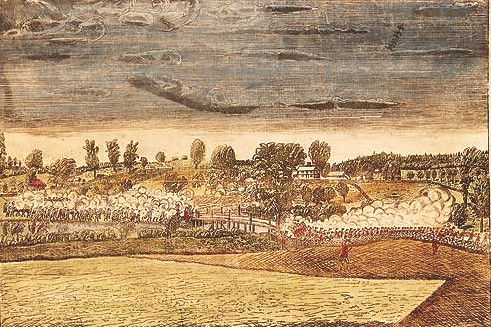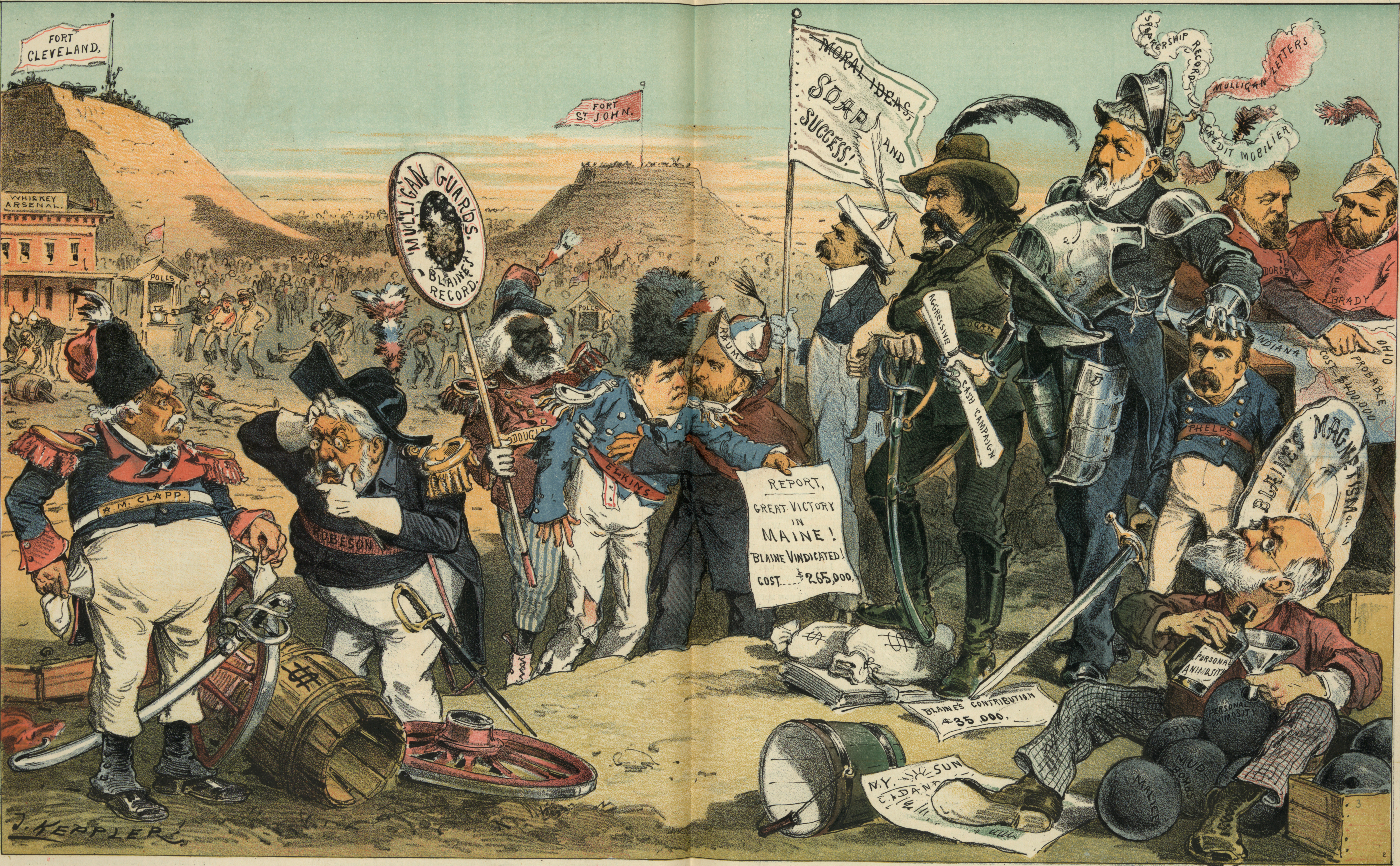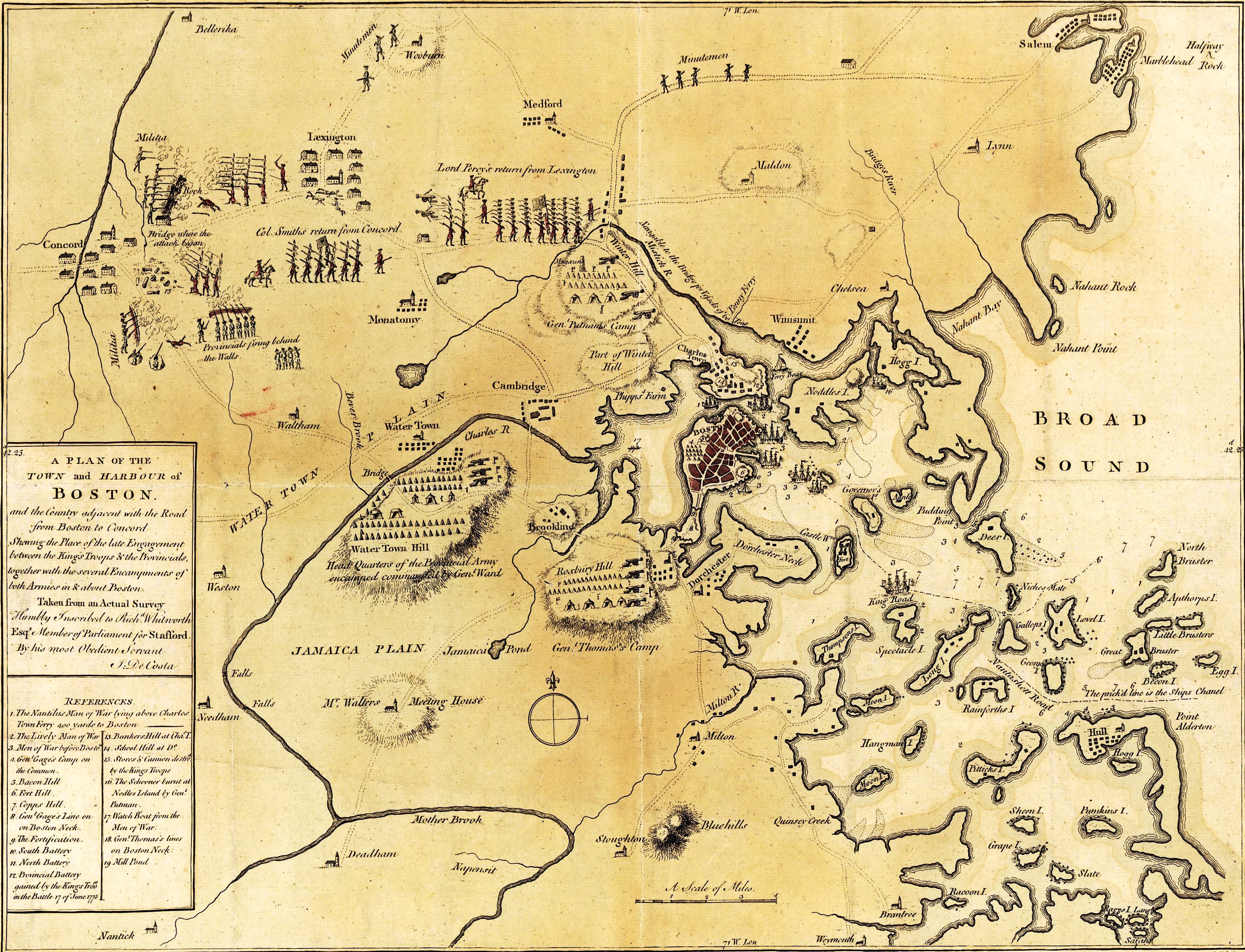|
Boston Campaign
The Boston campaign was the opening campaign of the American Revolutionary War, taking place primarily in the Province of Massachusetts Bay. The campaign began with the Battles of Lexington and Concord on April 19, 1775, in which the local colonial militias interdicted a British government attempt to seize military stores and leaders in Concord, Massachusetts. The entire British expedition suffered significant casualties during a running battle back to Charlestown against an ever-growing number of militia. Subsequently, accumulated militia forces surrounded the city of Boston, beginning the siege of Boston. The main action during the siege, the Battle of Bunker Hill on June 17, 1775, was one of the bloodiest encounters of the war, and resulted in a Pyrrhic British victory. Brooks (1999), p. 237 There were also numerous skirmishes near Boston and the coastal areas of Boston, resulting in loss of life, military supplies, or both. In July 1775, George Washington took command of t ... [...More Info...] [...Related Items...] OR: [Wikipedia] [Google] [Baidu] |
American Revolutionary War
The American Revolutionary War (April 19, 1775 – September 3, 1783), also known as the Revolutionary War or American War of Independence, was a major war of the American Revolution. Widely considered as the war that secured the independence of the United States, fighting began on April 19, 1775, followed by the Lee Resolution on July 2, 1776, and the Declaration of Independence on July 4, 1776. The American Patriots were supported by the Kingdom of France and, to a lesser extent, the Dutch Republic and the Spanish Empire, in a conflict taking place in North America, the Caribbean, and the Atlantic Ocean. Established by royal charter in the 17th and 18th centuries, the American colonies were largely autonomous in domestic affairs and commercially prosperous, trading with Britain and its Caribbean colonies, as well as other European powers via their Caribbean entrepôts. After British victory over the French in the Seven Years' War in 1763, tensions between the motherland and he ... [...More Info...] [...Related Items...] OR: [Wikipedia] [Google] [Baidu] |
Thomas Graves (admiral)
Admiral Sir Thomas Graves KB (c.1747 – 29 March 1814) was an officer of the Royal Navy who rose to the rank of admiral after service in the Seven Years' War, the American War of Independence, and the French Revolutionary and Napoleonic Wars. Family and early life Thomas Graves was born circa 1747, the third son of Reverend John Graves of Castle Dawson, County Londonderry, by his wife Jane Hudson. He was a nephew of Admiral Samuel Graves and a first cousin once removed of Admiral Thomas, Lord Graves. Graves' three brothers all served as captains in the navy, becoming admirals on the superannuated list. Thomas entered the navy at a very early age, and served during the Seven Years' War with his uncle Samuel on board , ''Duke'', and . After the peace he was appointed to with his cousin Thomas, whom he followed to , and by whom, in 1765, while on the coast of Africa, he was promoted to be lieutenant of . It is stated in Foster's ''Peerage'' that he was born in 1752, a date inco ... [...More Info...] [...Related Items...] OR: [Wikipedia] [Google] [Baidu] |
Townshend Acts
The Townshend Acts () or Townshend Duties, were a series of British acts of Parliament passed during 1767 and 1768 introducing a series of taxes and regulations to fund administration of the British colonies in America. They are named after the Chancellor of the Exchequer who proposed the program. Historians vary slightly as to which acts they include under the heading "Townshend Acts", but five are often listed: * The New York Restraining Act 1767 passed on 5 June 1767. * The Revenue Act 1767 passed on 26 June 1767. * The Indemnity Act 1767 passed on 29 June 1767. * The Commissioners of Customs Act 1767 passed on 29 June 1767. * The Vice Admiralty Court Act 1768 passed on 6 July 1768. The purposes of the acts were to: * raise revenue in the colonies to pay the salaries of governors and judges so that they would remain loyal to Great Britain. * create more effective means of enforcing compliance with trade regulations. * punish the Province of New York for failing to compl ... [...More Info...] [...Related Items...] OR: [Wikipedia] [Google] [Baidu] |
Parliament Of Great Britain
The Parliament of Great Britain was formed in May 1707 following the ratification of the Acts of Union by both the Parliament of England and the Parliament of Scotland. The Acts ratified the treaty of Union which created a new unified Kingdom of Great Britain and created the parliament of Great Britain located in the former home of the English parliament in the Palace of Westminster, near the City of London. This lasted nearly a century, until the Acts of Union 1800 merged the separate British and Irish Parliaments into a single Parliament of the United Kingdom with effect from 1 January 1801. History Following the Treaty of Union in 1706, Acts of Union ratifying the Treaty were passed in both the Parliament of England and the Parliament of Scotland, which created a new Kingdom of Great Britain. The Acts paved the way for the enactment of the treaty of Union which created a new parliament, referred to as the 'Parliament of Great Britain', based in the home of the former Eng ... [...More Info...] [...Related Items...] OR: [Wikipedia] [Google] [Baidu] |
Evacuation Day (Massachusetts)
Evacuation Day is a holiday observed on March 17 in Suffolk County, Massachusetts (which includes the cities of Boston, Chelsea, and Revere, and the town of Winthrop) List of Massachusetts holidays and also by the public schools in Somerville, Massachusetts. Somerville School Calendar The holiday commemorates the evacuation of British forces from the city of Boston following the siege of Boston, early in the American Revolutionary War. Schools and government offices (including some Massachusetts state government offices located in Suffolk County) are closed. If March 17 falls on a weekend, schools and government offices are closed on the following Monday in observance. It is the same day as Saint Patrick's Day, a coincidence that played a role in the establishment of the holiday. Historical background The 11-month siege of Boston ended when the Continental Army, under the command of George Washington, fortified Dorchester Heights in early March 1776 with cannons captured at ... [...More Info...] [...Related Items...] OR: [Wikipedia] [Google] [Baidu] |
Fortification Of Dorchester Heights
The Fortification of Dorchester Heights was a decisive action early in the American Revolutionary War that precipitated the end of the siege of Boston and the withdrawal of British troops from that city. On March 4, 1776, troops from the Continental Army under George Washington's command occupied Dorchester Heights, a series of low hills with a commanding view of Boston and its harbor, and mounted powerful cannons there threatening the city and the Navy ships in the harbor. General William Howe, commander of the British forces occupying Boston, planned an attack to dislodge them. However, after a snowstorm prevented its execution, Howe withdrew instead. British forces, accompanied by Loyalists who had fled to the city during the siege, evacuated the city on March 17 and sailed to Halifax, Nova Scotia. Background The siege of Boston began on April 19, 1775, when, in the aftermath of the Battles of Lexington and Concord, Colonial militia surrounded the city of Boston. Frothin ... [...More Info...] [...Related Items...] OR: [Wikipedia] [Google] [Baidu] |
Brooks
Brooks may refer to: Places ;Antarctica *Cape Brooks ;Canada *Brooks, Alberta ;United States *Brooks, Alabama * Brooks, Arkansas *Brooks, California *Brooks, Georgia * Brooks, Iowa * Brooks, Kentucky * Brooks, Maine *Brooks Township, Michigan *Brooks, Minnesota * Brooks, Montana *Brooks, Oregon *Brooks, San Antonio, Texas *Brooks City-Base, built on former United States Air Force base near San Antonio, Texas * Brooks, Wisconsin * Brooks Lake, a lake in Minnesota ;United States and Canada *The Brooks Range, mountain range in Alaska and Yukon People * Brooks (given name) * Brooks (surname) * Brooks (DJ), Dutch DJ, producer and musician Fictional characters * Brooks Hatlen, in the 1994 film ''The Shawshank Redemption'', played by James Whitmore * Dustin Brooks, in the TV series ''Power Rangers Ninja Storm'' * Earl Brooks, the title character of '' Mr. Brooks'', a film * Blade (character), also known as Eric Brooks in the Marvel Universe ** Blade (New Line Blade franchise charac ... [...More Info...] [...Related Items...] OR: [Wikipedia] [Google] [Baidu] |
Pyrrhic Victory
A Pyrrhic victory ( ) is a victory that inflicts such a devastating toll on the victor that it is tantamount to defeat. Such a victory negates any true sense of achievement or damages long-term progress. The phrase originates from a quote from Pyrrhus of Epirus, whose triumph against the Romans in the Battle of Asculum in 279 BC destroyed much of his forces, forcing the end of his campaign. Etymology ''Pyrrhic victory'' is named after King Pyrrhus of Epirus, whose army suffered irreplaceable casualties in defeating the Romans at the Battle of Heraclea in 280 BC and the Battle of Asculum in 279 BC, during the Pyrrhic War. After the latter battle, Plutarch relates in a report by Dionysius: In both Epirote victories, the Romans suffered greater casualties but they had a much larger pool of replacements, so the casualties had less impact on the Roman war effort than the losses of King Pyrrhus. The report is often quoted as or Examples War This list comprises examples of b ... [...More Info...] [...Related Items...] OR: [Wikipedia] [Google] [Baidu] |
Battle Of Bunker Hill
The Battle of Bunker Hill was fought on June 17, 1775, during the Siege of Boston in the first stage of the American Revolutionary War. The battle is named after Bunker Hill in Charlestown, Massachusetts, which was peripherally involved in the battle. It was the original objective of both the colonial and British troops, though the majority of combat took place on the adjacent hill which later became known as Breed's Hill. On June 13, 1775, the leaders of the colonial forces besieging Boston learned that the British were planning to send troops out from the city to fortify the unoccupied hills surrounding the city, which would give them control of Boston Harbor. In response, 1,200 colonial troops under the command of William Prescott stealthily occupied Bunker Hill and Breed's Hill. During the night, the colonists constructed a strong redoubt on Breed's Hill, as well as smaller fortified lines across the Charlestown Peninsula. By daybreak of June 17, the British became a ... [...More Info...] [...Related Items...] OR: [Wikipedia] [Google] [Baidu] |
Charlestown, Massachusetts
Charlestown is the oldest neighborhood in Boston, Massachusetts, in the United States. Originally called Mishawum by the Massachusett tribe, it is located on a peninsula north of the Charles River, across from downtown Boston, and also adjoins the Mystic River and Boston Harbor waterways. Charlestown was laid out in 1629 by engineer Thomas Graves, one of its earliest settlers, during the reign of Charles I of England. It was originally a separate town and the first capital of the Massachusetts Bay Colony. Charlestown became a city in 1848 and was annexed by Boston on January 5, 1874. With that, it also switched from Middlesex County, to which it had belonged since 1643, to Suffolk County. It has had a substantial Irish-American population since the migration of Irish people during the Great Irish Famine of the 1840s. Since the late 1980s, the neighborhood has changed dramatically because of its proximity to downtown and its colonial architecture. A mix of yuppie and upper-mid ... [...More Info...] [...Related Items...] OR: [Wikipedia] [Google] [Baidu] |
Concord, Massachusetts
Concord () is a town in Middlesex County, Massachusetts, in the United States. At the 2020 census, the town population was 18,491. The United States Census Bureau considers Concord part of Greater Boston. The town center is near where the confluence of the Sudbury and Assabet rivers forms the Concord River. The area that became the town of Concord was originally known as Musketaquid, an Algonquian word for "grassy plain." Concord was established in 1635 by a group of English settlers; by 1775, the population had grown to 1,400. As dissension between colonists in North America and the British crown intensified, 700 troops were sent to confiscate militia ordnance stored at Concord on April 19, 1775.Chidsey, p. 6. This is the total size of Smith's force. The ensuing conflict, the battles of Lexington and Concord, were the incidents (including the shot heard round the world) that triggered the American Revolutionary War. A rich literary community developed in Concord during the ... [...More Info...] [...Related Items...] OR: [Wikipedia] [Google] [Baidu] |






